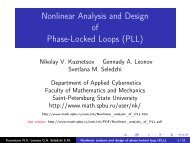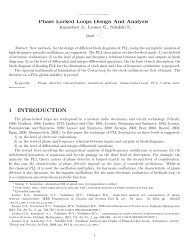Technical Sessions – Monday July 11
Technical Sessions – Monday July 11
Technical Sessions – Monday July 11
You also want an ePaper? Increase the reach of your titles
YUMPU automatically turns print PDFs into web optimized ePapers that Google loves.
TC-17 IFORS 20<strong>11</strong> - Melbourne<br />
1 - Hybrid Simulation Models for Healthcare<br />
Israel Vieira, School of Mathematics, Cardiff University,<br />
Senghennydd Road, CF24 4AG, Cardiff, United Kingdom,<br />
itvieira@hotmail.com<br />
Healthcare systems are embedded into the community they serve, they integrate<br />
a large network of service providers and exhibit dynamic, detailed and<br />
behavioural complexity. Effective and sustainable decision making in healthcare<br />
requires tools that can encompass complexity, handle variability and foresee<br />
the consequences of actions. In this talk we evaluated the extent to which<br />
hybrid models can capture the dynamics of complex healthcare systems, review<br />
existing tools supporting the development of multi-method models, and define<br />
best practice for combining methodologies into one model.<br />
2 - The Case for Combining: Developing Designs for Integrating<br />
System Dynamics (SD) and Discrete Event Simulation<br />
(DES) in Healthcare<br />
Jennifer Morgan, Management Science, University of<br />
Strathclyde, Graham Hills Building, 40 George St, G1 1QE,<br />
Glasgow, United Kingdom, jennifer.s.morgan@strath.ac.uk<br />
SD and DES have been extensively applied to a range of situations in many<br />
ways, and can provide complementary insights into a system. This research<br />
considers the value of combining these approaches and presents proposals for<br />
their integration within healthcare. Designs for linking and a framework for<br />
undertaking mixed modelling interventions are proposed, providing a toolkit<br />
of interaction options. The impact of applying this framework and designs to<br />
facilitate integration in practice is considered. Models developed with an oncology<br />
unit are discussed and proposed practices are reflected upon.<br />
3 - Assessing the Effectiveness of Infection Control Policies<br />
for MRSA in Different Hospital Settings using a<br />
Multiscale Modelling Framework<br />
Rosemarie Sadsad, University of New South Wales, Centre for<br />
Health Informatics, 2052, Sydney, New South Wales, Australia,<br />
r.sadsad@student.unsw.edu.au<br />
Infection control policies have mixed results for MRSA due to differences in<br />
context. A range of policies were simulated to study their impact on MRSA for<br />
different hospital settings. The model is based on a multiscale modelling framework<br />
and validated with two Australian hospitals. The incidence of MRSA<br />
was different across ward types and bed locations. The prevalence of MRSA<br />
responded to hand washing policies only. The incidence of MRSA responded<br />
to hand washing, staffing and cohorting policies. Models that consider context<br />
help identify appropriate hospital policies for particular settings.<br />
4 - Decision Support in Pre-hospital Stroke Care Operations:<br />
Improving Eligibility of Acute Stroke Patients for<br />
Thrombolysis Treatment with Simulation<br />
Leonid Churilov, The University of Melbourne, Neurosciences<br />
Bld, 300 Waterdale Rd, Austin Health, Repat Campus, 3083,<br />
Heidelberg Heights, VIC, Australia,<br />
leonid.churilov@gmail.com, Andrew Flitman, Helen Dewey<br />
There is a need for a solution capable of simultaneous systemic evaluation of<br />
multi-factorial interventions in pre-hospital acute care systems aimed at increasing<br />
patients’ eligibility for stroke thrombolysis. We propose an OR solution<br />
in the form of a simulation model that provides clear measure of the<br />
relative benefit of alternative potential interventions, thus demonstrating how<br />
OR modelling can be used for providing decision support in pre-hospital stroke<br />
care operations.<br />
� TC-17<br />
Tuesday, 15:00-16:30<br />
Meeting Room 214<br />
Network Optimisation<br />
Stream: Network Optimisation and Telecommunications<br />
Invited session<br />
Chair: Francisco Saldanha-da-Gama, CIO/DEIO, University of<br />
Lisbon, FCUL-DEIO, Bloco C6, Piso 4, 1749-016, Lisbon, Portugal,<br />
fsgama@fc.ul.pt<br />
1 - A Flow-dependent Quadratic Steiner Tree Problem in<br />
the Euclidean Plane<br />
Charl Ras, Department of Electrical and Electronic Engineering,<br />
University of Melbourne, Grattan Street, 3010, Parkville,<br />
56<br />
Victoria, Australia, cjras@unimelb.edu.au, Doreen Thomas,<br />
Marcus Brazil<br />
We introduce a flow-dependent version of the quadratic Steiner tree problem.<br />
An instance of the problem on a set of sources and a sink asks for a directed<br />
tree spanning these nodes and a bounded number of Steiner points, such that<br />
the sum of products of the edge-flows and the squares of the edge-lengths is a<br />
minimum. Our motivation for studying this problem is as a model for relayaugmentation<br />
of wireless sensor networks. We prove geometric results on the<br />
structure of optimal and locally optimal solution-trees and describe a geometric<br />
linear-time algorithm for fixed-topology construction.<br />
2 - Dual Decomposition for Computational Optimization<br />
of Minimum-Power Shared Broadcast Tree in Wireless<br />
Networks<br />
Di Yuan, Department of Science and Technology, Linköping<br />
University, SE 601 74, Norrköping, Sweden, diyua@itn.liu.se,<br />
Dag Haugland<br />
We consider the problem of constructing a minimum-power shared broadcast<br />
tree (SBT) in wireless communication networks. We approach SBT using dual<br />
decomposition method applied to an integer linear programming formulation.<br />
As a feature of the formulation, the relation between some of the variables is<br />
preferably formulated implicitly. The decomposition scheme is coupled with a<br />
fast local search algorithm. We report computational results demonstrating the<br />
effectiveness of the proposed approach. In average, the optimality gap is less<br />
than three percent.<br />
3 - Models and Algorithms for N-k Survivable Network Design<br />
Richard Chen, Quantitative Modeling and Analysis, Sandia<br />
National Laboratories, P.O. Box 969 MS 9155, 3806 Picard Ave.,<br />
94551, Pleasanton, CA, United States, rlchen@sandia.gov<br />
We present general bilevel and trilevel optimization models to identify vulnerabilities<br />
in a network and plan expansion and defensive measures. We describe<br />
a new decomposition-separation algorithm for finding an optimal solution to<br />
the trilevel model. We illustrate the applicability of trilevel optimization to the<br />
N-k problem in power system design. Given a power system represented by a<br />
network with equations governing power flow, power generation and consumption,<br />
how do you optimally enhance the system to survive the simultaneous<br />
failure of k or fewer components?<br />
4 - Hub Location Problems with Multiple Flow Categories<br />
Francisco Saldanha-da-Gama, CIO/DEIO, University of Lisbon,<br />
FCUL-DEIO, Bloco C6, Piso 4, 1749-016, Lisbon, Portugal,<br />
fsgama@fc.ul.pt, Isabel Correia, Stefan Nickel<br />
In this paper, a unified modeling framework is proposed for capacitated hub<br />
location problems with multiple flow categories. At most one hub (dedicated<br />
or not) can be located in each node. The capacity constraints refer to the nonprocessed<br />
incoming flow to the hubs. The framework includes several situations<br />
of practical interest. A mixed-integer linear programming formulation<br />
enhanced with several sets of additional inequalities is proposed as well as a<br />
reformulation yielding tighter lower bounds. A computational analysis is presented<br />
using data derived from the well-known AP data set.<br />
� TC-18<br />
Tuesday, 15:00-16:30<br />
Meeting Room 215<br />
Applications of DEA<br />
Stream: Data Envelopment Analysis<br />
Invited session<br />
Chair: Arash Aliakbari, Parto Novin Modiriat Iranian (Penco<br />
Consulting Group ), Flat 4, No 22 , Unit 22 Separ St, Africa Blvd.,<br />
Tehran, Iran, Islamic Republic Of, arashaliakbari@yahoo.com<br />
1 - DEA Applications of Human Capital Investment to<br />
Achieve Knowledge-Based Economy in ASEAN5<br />
Elsadig Ahmed, Faculty of Business and Law, Multimedia<br />
University, 75450, Melaka, Malaysia, elsadigmusa@yahoo.com




